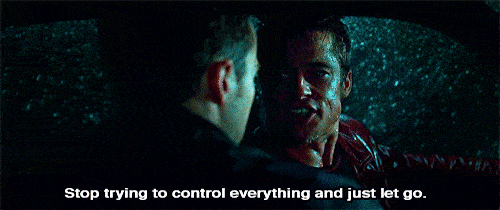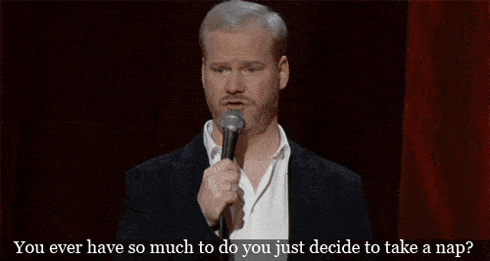We all over-think things at times, though luckily most are able to get over it. Some of us, however, are afflicted in such an unfortunate manner that we’re practically always over-thinking about one thing or another. What does this kind of constant rumination do to us? How does it affect our lives? What can we do to deal with it? Find out below …
1. Imagining worst-case scenarios.
Yeah, this one’s obvious, but it needs to be stated nonetheless. Yesterday I had to drive for six hours, and kept worrying about missing my exits, overheating my engine, running out of gas, etc. Turned out everything went swimmingly, my car ran well, my GPS got me to where I needed to go, and I got some awesome mileage out of my hybrid (impressive seeing as it’s a model from 2003). Over-thinkers are always analyzing everything that could possibly go wrong in any given situation, which can be a real problem since this sort of fear and anxiety can prevent them from doing things that need to get done. It’s not a rational fear, either. Even if an over-thinker does something a thousand times with no issues, it only takes one slip-up for them to no longer feel confident doing whatever it was they were doing just fine a minute ago.
Here’s what you can do:
Though I still worry about everything that can go wrong at any given moment, I’ve gotten a bit better simply by forcing myself to go out there and do new things. When you start doing all of the things you’re fearful of, you’ll learn that, at worst, only a couple things will go wrong, and it won’t be nearly as terrifying as you imagined. The truth of the matter is that you’ll find that you’re well equipped to handle most trying situations, even when you assume you can’t.
2. Ignoring the obvious.
I once spent several hours picking out the perfect café to go to with my girlfriend. I looked at reviews, checked out the areas they were in, looked at prices, the whole nine yards! Lo and behold, when we got there the place was closed. Moral of the story: over-thinking things can and will lead to you missing details that any normal person would have picked up on fairly quickly.
Here’s what you can do:
Try to be more spontaneous. Had I just winged it and picked any old café on the street, I would have saved myself a lot of trouble in terms of prep time and worrying about all of the tiny details, which only prevented me from seeing the big picture (i.e., when they were open).
3. Being unable to sleep.
This is another classic symptom of over-thinking. You’ll be thrashing around in your bed, bruising your pillows, heating up your sheets, and generally causing a ruckus, even when, in actuality, you’re extremely tired and just want to sleep. What causes this? Analyzing every single detail of what went down during the day, as well as mentally prepping for all of the things you’re worried about for tomorrow.
Here’s what you can do:
Exercise before bed. It won’t get rid of all of your nagging thoughts, but you’ll expel the majority of the nervous energy that normally prevents you from conking out as soon as your head hits the pillow.
4. Refusing to let go of minor things.
Over-thinkers have a tendency to let a single (often minor) event ruin their day. For instance, a rude e-mail from your school or work, or a comment from a complete stranger that rubbed you the wrong way. Over-thinkers often go into rage mode over stuff like this, plotting different ways to get back at people (all imagined of course), conjuring alternate realities (in their minds) in order to explore how they could have avoided said situation, and all in all letting whatever happened to them take control of their lives.
Here’s what you can do:
You just need to realize that what’s in the past is in the past. It happened, and you can’t do anything about it now besides move forward into the future. Don’t let minor things upset you; in a week you’ll forget why you were even angry.
5. Failing tests.
OK, so over-thinkers don’t “fail” tests per se, but we have a tendency to chew on questions far more than most people. I’ll use an example from the GRE, which is a test you need to take to apply to most graduate schools. Though I’m pretty good at the verbal portion of the test, there were times I would shoot myself in the foot by assuming that certain questions were trying to trick me, which only led to me thinking things over way too much and getting the wrong answer. This didn’t happen too often (since the GRE is one test where over-thinking is a bit useful), but it was noticeable.
Here’s what you can do:
That old saying “go with your first instinct” holds up well here. Most of the time, when I over-think my answer to a question, I end up going with my second instinct, when in reality my gut had it right all along.
6. Experiencing the “time anxiety paradox.”
This is a neat little phrase I made up to describe when you’re wasting time during the day and wishing you weren’t, though you are too distracted by poisonous thoughts to do anything about it. So for instance, you’ll be sitting in your chair, wishing you were doing something productive. You’ll think to yourself, “Hmm, well I could read a book, play a game, write something, apply to jobs, apply to colleges, clean my room,” etc. All the while, you’ll be looking at your clock, your anxiety rising as the minutes and hours tick by while you sit there being generally unproductive.
It’s a bit of a paradox really. You’re anxious and over-thinking things because you feel like you’re wasting a day, but the only reason you’re wasting the day is because you’re too busy worrying about what to do instead of actually doing something.
Here’s what you can do:
This is a toughie. The only way out of this trap is to pick something, anything to do, even if you have no motivation to do it. Give yourself five minutes to do said task or activity. I guarantee that after those five minutes you’ll start having fun, and you’ll be released from the time anxiety paradox.
7. The menu conundrum.
I hate menus, same as other over-thinkers. It’s not like I don’t know what I want, it’s that I keep imagining all of the other possibilities, weighing whether if, in the end, I’d enjoy a salad over a burger, or chicken over beef, or iced tea over water, or curly fries instead of regular. No matter what an over-thinker chooses, there will be a few minutes of doubt after the fact as they imagine what could have been.
Here’s what you can do:
At the very least, do your menu research before you get to the restaurant so that you go in with a plan (though that in itself is a form of over-thinking). Or, pick a type food you’ll stick to when you go out, as a sort of “safety.” Mine happens to be the good old-fashioned burger. If a menu is freaking me out and I’m starting to get anxious, I usually have that to turn to and it generally always turns out pretty well!
8. You have no problem finishing things; starting them is the issue.
This is a problem for me mainly when it comes to videogames. I’ll buy a game and want to finish it, but I’ll be prevented from doing so thanks to thoughts that sound a bit like this: “Well, even if I play it for two hours today, at that pace there’s no way I’ll be finished before next month, and by then I’ll be working more and have schoolwork and have that test, oh, and a dentist’s appointment … yeah, might as well not start at all since I won’t even be able to really enjoy it.”
Here’s what you can do:
As with the time anxiety paradox, the key is to just start. You’ll have fun, and regardless of whether or not it’ll conflict with events that happen in the future, there’s no reason to cut yourself down before you even start. Give it a try and go with the flow!
9. You are accused of being too “silent.”
Over-thinkers hate being accused of adding little to nothing to a conversation. Much to their chagrin, however, this happens often, mainly because they’ll chew over what they want to say for a decent period of time, perfecting it, waiting for the right moment to speak.
Here’s what you can do:
Show people that, while you don’t have as much to say as the social butterflies in your group, what you do say is more thoughtful, impactful, and significant. Soon enough, people will quit calling out your silence because they’ll realize that there’s a good reason for it.
10. The stutter effect.
Oh, how I hate dealing with drive-thru operators and other cashiers. Not because I dislike them personally; I just can’t remember the last time I spoke to one of them without mangling the English language. This happens to me at Starbucks a lot. I’ll be thinking in my head, “OK, don’t forget, triple grande vanilla latte hot, don’t forget!” While reciting that line in my head, I’ll also be worrying about something else, like making sure to speak clearly.
The result is usually something like this: “Hi, I’ll have a triple g-g-grande vanilla(?) latte … uh … oh and can you make it h-hot?” Nine time out of ten, the Starbucks drive-thru person will scoff at me and say, “Can you please say that again, sir,” which only makes it worse.
Here’s what you can do:
Try to clear your head before you speak to a cashier, drive-thru operator, etc. When you aren’t worrying about every word you need to deliver, your subconscious takes over and will make you sound like the confident human being you are. I’m still working on this, but I think I’ve at least gotten over the stuttering. Now it’s just a matter of speaking clearly enough for them to understand what I’m saying!
I hope you enjoyed this list. To all my fellow over-thinkers: we’re all going to make it!
Featured photo credit: Anxiety/ Mariana Zanatta via flickr.com






















































